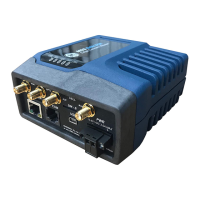MDS 05-6632A01, Rev. F MDS Orbit MCR/ECR Technical Manual 147
The unit is designed to store up to 10100 events before rolling over losing event history. An alarm
(eventlog_high_water) is generated when approaching the maximum event storage limit. Another alarm
(eventlog_full) is generated when the maximum value is reached. Each time the log reaches the maximum
the value 100 oldest events will be deleted.
By default for security the logging is configured to be verbose and the log file may fill in a relatively short
time for a very active system.
All events can be configured to be logged to any combination of the following locations based on the
event type:
Local: Store event in the local event log.
Netconf-notification: generate a NETCONF notification
Syslog: Forward events to a remote syslog server.
There are a number of default rules which can be modified to be active on the web UI. Refer to the
Default Event Rule table located on the page Logging---> Basic Config.
Each rule has the following setting types:
Name - system recognized short name
Description - Supplied descriptive text
Local - If true, this event is stored in the local event log. True/False
Priority - If logging to Syslog
- alert - action must be taken immediately
- crit - critical condition
- debug - debug-level messages
- emerg - system is unusable
- err - error condition
- info - informational set
- notice - normal but significant condition
- warning - warning condition
Syslog Facility - If logging to SysLog selection of : auth, authpriv, cron, daemon, ftp, kern,
lpr, mail, news, syslog, user, uucp, local0, local1, local2, local3, local4, local5, local6, local7
Syslog - If true, forward events of this type to a syslog server.
SNMP Notification - If true, generate an SNMP notification (trap or inform) for events of this
type.
SNMP Notify Name - Selection of a set of management targets which should receive
notifications, as well as the type of notification (trap/inform). These should be sent to each
selected management target. If the notify-name is not configured, the notification is sent to all
configured targets
NETCONF Notification - If true, generate a NETCONF notification for events of this type.
Alarm - If true, generate an alarm output for events of this type.
Alarm Outputs - Generate an alarm on all of these alarm outputs.
Logs are stored in the Event Log, which may be viewed on the Web UI by navigating to Logging --->
Status and scrolling down to Event Log section, as shown in the following example.

